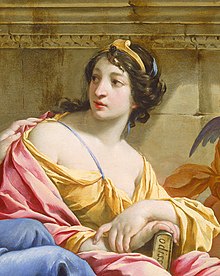Calliope: Difference between revisions
Reverted 1 edit by 76.25.32.143 (talk). (TW) |
|||
| Line 4: | Line 4: | ||
In [[Greek mythology]], '''Calliope''' ({{IPAc-en|icon|k|ə|ˈ|l|aɪ|.|ə|p|iː}} {{respell|kə|LY|ə-pee}}; {{lang-grc|Καλλιόπη}} ''Kalliope'' "beautiful-voiced") was the [[muse]] of epic poetry,<ref>Lempriere, D.D., 1788. A Classical Dictionary. London: Milner and Sowerby. pp. 132</ref> daughter of [[Zeus]] and [[Mnemosyne]], and is now best known as [[Homer]]'s muse, the inspiration for the [[Odyssey]] and the [[Iliad]]. |
In [[Greek mythology]], '''Calliope''' ({{IPAc-en|icon|k|ə|ˈ|l|aɪ|.|ə|p|iː}} {{respell|kə|LY|ə-pee}}; {{lang-grc|Καλλιόπη}} ''Kalliope'' "beautiful-voiced") was the [[muse]] of epic poetry,<ref>Lempriere, D.D., 1788. A Classical Dictionary. London: Milner and Sowerby. pp. 132</ref> daughter of [[Zeus]] and [[Mnemosyne]], and is now best known as [[Homer]]'s muse, the inspiration for the [[Odyssey]] and the [[Iliad]]. |
||
One account says Calliope was the lover of the war god [[Ares]], and bore him several sons: [[Mygdon]], [[Edonus]], [[Biston]], and [[Odomantus]] (or |
One account says Calliope was the lover of the war god [[Ares]], and bore him several sons: [[Mygdon]], [[Edonus]], [[Biston]], and [[Odomantus]] (or Odomas), respectively the founders of Thracian tribes known as the [[Mygdones]], [[Edones]], [[Bistoni|Bistones]], and [[Odomantes]]. |
||
Calliope also had two famous sons, [[Orpheus]]<ref>The Greek Gods by Hoopes And Evslin, ISBN 0-590-44110-8, ISBN 0-590-44110-8, 1995, page 77 His father was a Thracian king; His mother the muse Calliope. For a while he lived on Parnassus with his mother and his eight beautiful aunts and there met Apollo who was courting the laughing muse Thalia. Apollo was taken with Orpheus, gave him his little golden lyre m, and taught him to play. And his mother taught him to make verses for singing.</ref> and [[Linus (mythology)|Linus]],<ref>Apollodorus, Library and Epitome, 2.4.9, This Linus was a brother of Orpheus; he came to Thebes and became a Theban</ref> by either [[Apollo]] or the king [[Oeagrus]] of [[Thrace]]. She taught Orpheus verses for singing.<ref>The Greek Gods by Hoopes And Evslin, ISBN 0-590-44110-8, ISBN 0-590-44110-8, 1995, page 77 |
Calliope also had two famous sons, [[Orpheus]]<ref>The Greek Gods by Hoopes And Evslin, ISBN 0-590-44110-8, ISBN 0-590-44110-8, 1995, page 77 His father was a Thracian king; His mother the muse Calliope. For a while he lived on Parnassus with his mother and his eight beautiful aunts and there met Apollo who was courting the laughing muse Thalia. Apollo was taken with Orpheus, gave him his little golden lyre m, and taught him to play. And his mother taught him to make verses for singing.</ref> and [[Linus (mythology)|Linus]],<ref>Apollodorus, Library and Epitome, 2.4.9, This Linus was a brother of Orpheus; he came to Thebes and became a Theban</ref> by either [[Apollo]] or the king [[Oeagrus]] of [[Thrace]]. She taught Orpheus verses for singing.<ref>The Greek Gods by Hoopes And Evslin, ISBN 0-590-44110-8, ISBN 0-590-44110-8, 1995, page 77 |
||
Revision as of 08:45, 4 December 2011

In Greek mythology, Calliope (/[invalid input: 'icon']kəˈlaɪ.əpiː/ kə-LY-ə-pee; Ancient Greek: Καλλιόπη Kalliope "beautiful-voiced") was the muse of epic poetry,[1] daughter of Zeus and Mnemosyne, and is now best known as Homer's muse, the inspiration for the Odyssey and the Iliad.
One account says Calliope was the lover of the war god Ares, and bore him several sons: Mygdon, Edonus, Biston, and Odomantus (or Odomas), respectively the founders of Thracian tribes known as the Mygdones, Edones, Bistones, and Odomantes.
Calliope also had two famous sons, Orpheus[2] and Linus,[3] by either Apollo or the king Oeagrus of Thrace. She taught Orpheus verses for singing.[4] She was the wisest of the Muses, as well as the most assertive. She married Oeagrus close to Pimpleia,[5] Olympus.
Calliope is always seen with a writing tablet in her hand. At times, she is depicted as carrying a roll of paper or a book or as wearing a gold crown.
References
- ^ Lempriere, D.D., 1788. A Classical Dictionary. London: Milner and Sowerby. pp. 132
- ^ The Greek Gods by Hoopes And Evslin, ISBN 0-590-44110-8, ISBN 0-590-44110-8, 1995, page 77 His father was a Thracian king; His mother the muse Calliope. For a while he lived on Parnassus with his mother and his eight beautiful aunts and there met Apollo who was courting the laughing muse Thalia. Apollo was taken with Orpheus, gave him his little golden lyre m, and taught him to play. And his mother taught him to make verses for singing.
- ^ Apollodorus, Library and Epitome, 2.4.9, This Linus was a brother of Orpheus; he came to Thebes and became a Theban
- ^ The Greek Gods by Hoopes And Evslin, ISBN 0-590-44110-8, ISBN 0-590-44110-8, 1995, page 77 His father was a Thracian king; His mother the muse Calliope. For a while he lived on Parnassus with his mother and his eight beautiful aunts and there met Apollo who was courting the laughing muse Thalia. Apollo was taken with Orpheus, gave him his little golden lyre m, and taught him to play. And his mother taught him to make verses for singing.
- ^ THE ARGONAUTICA,BOOK I,"(ll. 23-34) First then let us name Orpheus whom once Calliope bare, it is said, wedded to Thracian Oeagrus, near the Pimpleian height. Men say that he by the music of his songs charmed the stubborn rocks upon the mountains and the course of rivers. And the wild oak-trees to this day,tokens of that magic strain, that grow at Zone on the Thracian shore,stand in ordered ranks close together, the same which under the charm of his lyre he led down from Pieria."
